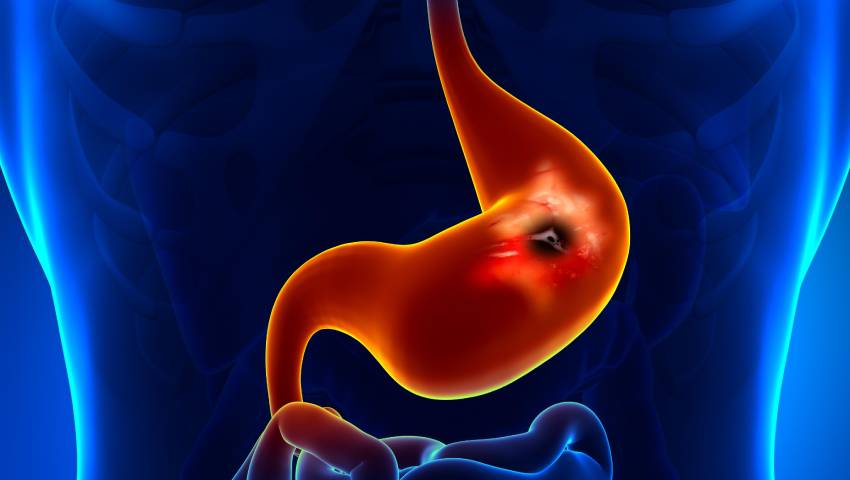- 19/10/2025
- by Dr. Pinak Dasgupta
- Blog
Peptic ulcers are painful sores that form on the inner lining of your stomach or the upper part of your small intestine. While most ulcers heal with medications and lifestyle changes, some require surgery, especially when complications arise. In this blog, we will discuss when peptic ulcer surgery becomes necessary, the types of surgical procedures available, and how advanced techniques like robotic and laparoscopic surgery make treatment safer and more effective.
If you are looking for the Best GI Surgeon in Chennai, Dr. Pinak Dasgupta, a leading Robotic Surgeon in Chennai, offers specialised care for complex gastrointestinal and ulcer-related conditions at GEM Hospital, Chennai.
Understanding Peptic Ulcers:
A peptic ulcer develops when stomach acid damages the lining of the digestive tract. The two main types are:
- Gastric ulcers: Found in the stomach.
- Duodenal ulcers: Found in the upper part of the small intestine.
The most common causes include:
- Helicobacter pylori (H. pylori) infection
- Regular use of painkillers (NSAIDs)
- Excess acid production due to stress, smoking, or alcohol
- Family history of ulcers
When Is Surgery for Peptic Ulcers Necessary?
Most ulcers can be effectively treated with antibiotics, acid-reducing medications, and lifestyle modifications. However, surgery becomes necessary in the following situations:
- Bleeding Ulcer: If the ulcer causes severe internal bleeding that cannot be controlled with endoscopy or medicines, surgical treatment is required.
- Perforated Ulcer: A perforated ulcer occurs when the ulcer creates a hole in the wall of the stomach or intestine. This leads to leakage of stomach contents into the abdominal cavity, causing a serious infection (peritonitis). This is a surgical emergency.
- Obstruction or Narrowing: Chronic ulcers can cause swelling or scarring that blocks food from passing through the digestive tract. Surgery helps remove the obstruction and restore normal digestion.
- Recurrent or Non-healing Ulcers: Sometimes, even after months of medical therapy, ulcers do not heal or keep returning. In such cases, surgical intervention may be the best option to prevent future complications.
- Suspicion of Cancer: In rare cases, gastric ulcers may resemble stomach cancer. If there is any suspicion, surgery is done to remove the affected area for further testing.
Types of Surgery for Peptic Ulcers:
Modern surgical techniques have evolved significantly. Today, patients can benefit from minimally invasive and robotic-assisted procedures that ensure faster recovery and minimal pain.
- Vagotomy: This procedure involves cutting certain branches of the vagus nerve to reduce acid production in the stomach. It helps prevent ulcer recurrence.
- Antrectomy: In this surgery, the lower part of the stomach (antrum), which produces acid-stimulating hormones, is removed. It is often combined with vagotomy for better results.
- Pyloroplasty: When ulcers cause narrowing at the stomach outlet, a pyloroplasty widens the passage, allowing food to move freely into the small intestine.
- Partial Gastrectomy: If a portion of the stomach is severely affected by ulcers, the damaged section is surgically removed.
Robotic and Laparoscopic Surgery for Peptic Ulcers:
With advancements in surgical technology, robotic and laparoscopic surgery have become preferred options for ulcer-related operations.
Dr. Pinak Dasgupta, a highly experienced Laparoscopic Surgeon in Chennai and Robotic Surgeon in Chennai, uses state-of-the-art robotic systems for precise, minimally invasive procedures.
Benefits of Robotic and Laparoscopic Surgery
- Smaller cuts and minimal scarring
- Less blood loss during surgery
- Reduced postoperative pain
- Faster recovery and shorter hospital stay
- Lower risk of complications
- Better surgical precision
These advantages make robotic and laparoscopic surgeries an excellent choice for patients who require ulcer surgery, especially those with complex cases or previous abdominal surgeries.
Why Choose Dr. Pinak Dasgupta for Peptic Ulcer Surgery in Chennai?
Dr. Pinak Dasgupta is one of the Best GI Surgeons in Chennai, known for his expertise in robotic and minimally invasive gastrointestinal surgeries.
Here’s why patients trust him for ulcer and GI treatments:
- 21+ years of surgical experience in gastrointestinal, colorectal, and hernia surgery
- Over 5000 successful surgeries including complex abdominal cases
- Head of Robotic, Colorectal, and Hernia Surgery at GEM Hospital, Chennai
- Intuitive DaVinci Robotic Certified Surgeon with advanced robotic console skills
- Gold Medalist in Endoscopy (EFIAGES)
- Award-winning surgeon, recognised by national and international surgical societies
Dr. Dasgupta focuses on patient safety, comfort, and quick recovery. His approach combines medical excellence with compassionate care, ensuring every patient receives the best possible outcome.
Recovery After Peptic Ulcer Surgery:
Recovery time depends on the type of surgery performed. Patients who undergo robotic or laparoscopic surgery typically recover faster than those who have open surgery.
Postoperative tips for faster recovery:
- Follow your surgeon’s diet and medication plan
- Avoid smoking and alcohol
- Eat small, frequent meals
- Manage stress and get enough rest
- Attend regular follow-up appointments
Most patients can return to normal activities within 2–4 weeks after minimally invasive surgery.
When to Consult a Doctor?
If you experience any of the following symptoms, consult a Surgical Gastroenterologist in Chennai immediately:
- Severe abdominal pain
- Vomiting blood or coffee-ground-like material
- Black or tarry stools
- Sudden bloating or tenderness in the abdomen
- Unexplained weight loss
These could be signs of a complicated ulcer that needs urgent evaluation.
Conclusion:
Surgery for peptic ulcers is not always necessary, but it can be lifesaving when complications occur. With the availability of robotic and laparoscopic techniques, patients now have safer and faster recovery options.
If you are suffering from peptic ulcer complications or need expert advice, consult Dr. Pinak Dasgupta, the Best GI Surgeon in Chennai, at GEM Hospital, Perungudi, Chennai. His expertise in minimally invasive and robotic gastrointestinal surgery ensures precise treatment and lasting relief.



